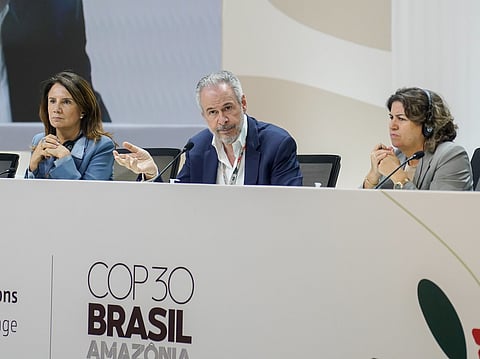

The 30th Conference of the Parties (COP30) to the United Nations Framework Convention on Climate Change formally launched an integrated forum on Climate Change and Trade (IFCCT) on November 15 to create a permanent, politically supported space where countries can address the increasingly contentious intersection between trade policies and climate action.
This comes as countries and experts acknowledge that the intersection between trade and climate policy has become too consequential—and too contentious—to leave unmanaged.
Framed by the COP30 Presidency as a central pillar of its Action Agenda, the Forum aims to provide a politically supported but non-negotiating space where governments can openly discuss how trade measures, climate ambition, and development priorities interact.
The launch event, opened by COP30 President André Corrêa do Lago, urged Parties to “build the structures that allow for the change required on climate and trade,” noting that the world can no longer treat the two domains as separate.
The Presidency announced that the Forum will begin with an open-ended consultation process extending into 2026, inviting countries to help define which topics should be discussed and what the Forum’s jurisdiction should be. The first round of consultations will take place in Geneva from December 15-19, a symbolic move that situates climate-trade dialogue at the centre of the multilateral trading system.
Countries presented sharply varied national perspectives while agreeing on one core point: trade policy will shape countries’ ability to meet climate goals. China stressed the growing impacts of unilateral trade measures, including tariffs and border carbon adjustments, on developing countries, arguing that discussions must be rooted in “common but differentiated responsibilities” and an understanding of unequal economic capacities.
Australia highlighted concerns around global overproduction and supply-chain distortions, while New Zealand and the United Kingdom emphasised the need for open, rules-based trade to support emissions reductions and the clean-tech transition. Despite these differences, all countries expressed support for participating in the consultation phase.
The launch drew strong participation from civil society organisations, business associations, and international initiatives, with statements from the World Trade Organization (WTO), International Chamber of Commerce, Energy Foundation China, the Climate Club, European Climate Foundation, and Open Society Foundations. Their interventions underscored both the urgency of a structured dialogue and the mounting anxiety over escalating trade frictions linked to climate policies.
WTO Deputy Director-General Angela Ellard, reflecting broader institutional concern, noted that an expanding patchwork of climate-related trade measures risks undermining predictability in the global trading system unless countries coordinate more effectively.
Welcoming the Forum as an important opportunity to bridge divides between climate ambition and trade policy, external experts like Daouda Sembene of Africatalyst said the initiative could help developing countries gain a stronger voice in shaping emerging trade rules.
Alfonso Medinilla of ECDPM warned that climate-related trade measures are proliferating faster than developing countries can absorb, calling the Forum an opportunity to create “interoperability rather than fragmentation.” Ellie Belton of E3G added that participation by major economies such as the European Union (EU) and United Kingdom could help rebuild trust and shift the narrative around instruments like the EU’s Carbon Border Adjustment Mechanism.
The European Union’s absence from the launch, despite prior signals that it would attend, was noted by several participants. While European voices from civil society provided some presence, diplomats acknowledged the need to re-engage the EU delegation to understand its strategy ahead of the Geneva consultations.
With global climate ambition now deeply intertwined with trade disputes, industrial policy, and supply-chain vulnerabilities, the IFCCT represents a strategic bet by the COP30 Presidency: that only structured, sustained dialogue can prevent trade from becoming a growing fault line in global climate efforts. The coming months will reveal whether major economies are ready to engage fully—and whether the Forum can evolve into a trusted space capable of easing tensions and guiding the world toward more coherent, climate-aligned trade policy.